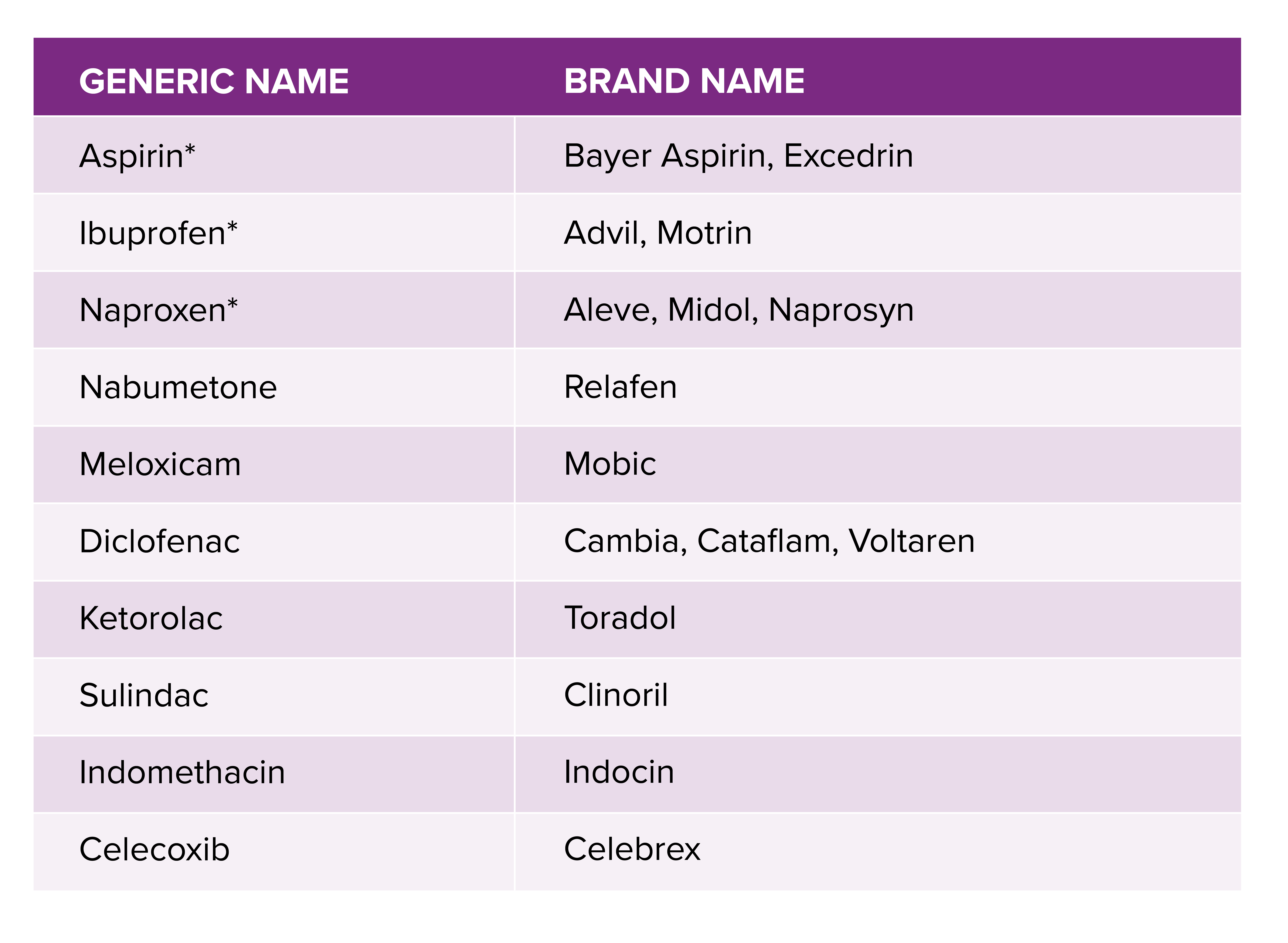Most people take NSAIDS (Non-steroidal anti-inflammatory drugs) for headaches, fever, muscle aches, colds, menstrual cramps, and other common conditions to relieve associated pain and inflammation. However, while taking these over-the-counter medicines, it is essential to understand their safety usage, effects, and associated risks in order to prevent further complications.
What are NSAIDs?
NSAIDs are non-steroidal anti-inflammatory drugs widely used to relieve pain, reduce inflammation, and bring down a high temperature.
NSAIDs are commonly used as an:
- Analgesic (Relieves Pain)
- Antipyretic (Relieves Fever)
- Anti-inflammatory (like corticosteroids)
Some of the most commonly known NSAIDs available over the counter (OTC) in low dosages are:

On the other hand, you can be prescribed higher dosages of NSAIDs for chronic pain associated with conditions such as arthritis, migraines, and even physical issues such as muscle or nerve pain. Note that NSAIDs do not generally change the course of a disease and are primarily used for symptomatic relief.
How to use NSAIDs
Directions on how to take a particular NSAID might look different depending on the individual, and their condition and/or pain management course.
- NSAIDs should be taken with food to minimize gastrointestinal (GI) discomfort.
- NSAIDs should not be used continuously for more than 3 days for fever and more than 10 days for pain without consulting a doctor first.
- Take the lowest effective dose for the shortest amount of time to avoid side effects.
- You may consider 2 weeks of treatment before switching to another drug.
NSAIDs side effects
Generally, the side effects associated with NSAIDs are infrequent and not experienced by everyone.
Common NSAIDs side effects from short-term use:
- GI distress (stomach pain, gas, heartburn, nausea, vomiting, constipation, diarrhea).
- Headache
Possible side effects & toxicity from long-term use:
- Kidney: Decreased or worsen kidney function, especially in chronic kidney disease (CKD) patients. Increased potassium levels, fluid retention (swelling), and diuretic medication resistance.
- Cardiovascular: Raises blood pressure, negating the action of some blood pressure medications.
- Ringing in the ears (Tinnitus) & hearing loss: Common with high doses of aspirin, less risk with other NSAIDs. Usually resolves when the NSAIDs are stopped or decreased.
- Gastrointestinal (GI): GI ulcers, upset stomach, and bleeding from the GI tract. Drinking alcohol while taking NSAIDs increases the risk of bleeding.
NSAIDs Interactions with other medications (Drug-Drug Interactions):
- Aspirin: NSAIDs may increase aspirin resistance, negating cardioprotective benefits of aspiring and increasing bleeding risk.
- Blood thinners (Warfarin): Increases INR and bleeding risk.
- Corticosteroids (Prednisone): Increase GI complications.
- ACE inhibitors (e.g., lisinopril, enalapril): Increase the risk of kidney injury, negate benefits of this medication.
- SSRI Antidepressants (e.g., fluoxetine, citalopram): Increase the risk of GI complications.
Patients with cardiovascular diseases should consider the following when choosing NSAIDs:
- Topical NSAIDs, Topical Capsaicin and Acetaminophen are preferable.
- If NSAID therapy is required, use Naproxen or Ibuprofen if no GI bleeding exists. If Gi bleeding does exist, use Celecoxib.
- If you have not experienced any recent cardiovascular event, use Celecoxib and Naproxen when long-term use (more than one month) is needed.
If you are pregnant or lactating:
- Avoid the use of NSAIDs in pregnancy, especially after week 20 of pregnancy. Acetaminophen is considered the safer option.
- In lactation, ibuprofen is the preferred NSAID. Avoid aspirin as there is a risk of Reye’s Syndrome developing in the fetus.
Both adults and children can benefit from short-term pain/inflammatory relief provided by NSAIDs, but even short-term usage can pose potential risks such as high blood pressure, rashes, stomach issues, and other concerning changes. Like with all medicines, you should consult with your healthcare provider to see which are right for you. To prevent episodes of stomach bleeding, heart attack risks, and kidney damage, it is crucial to be aware of the risks associated with taking certain NSAIDs and other medications at the same time, or other over-the-counter medicines with the same active ingredients.
__
*This blog post was written by John Nieves Cartagena, B.S., Pharm.D Candidate at Abarca Health.
References:
- Rollason V, Samer CF, Daali Y, Desmeules JA. Prediction by pharmacogenetics of safety and efficacy of non-steroidal anti-inflammatory drugs: a review. Curr Drug Metab 2014; 15:326.
- Brooks PM, Day RO. Nonsteroidal anti-inflammatory drugs–differences and similarities. N Engl J Med 1991; 324:1716.
- UpToDate.com, Daniel H Solomon, MD, MPH.